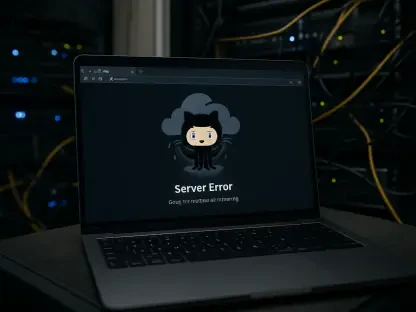Imagine a major retailer, responsible for feeding millions across the UK and Ireland, suddenly facing a tech crisis that could halt its operations. This is the reality for Tesco, embroiled in a high-stakes legal battle with Broadcom over VMware licensing changes. With a claim for at least $134 million in damages, this dispute has sent shockwaves through the tech and retail sectors. This roundup dives into the heart of the conflict, gathering insights, opinions, and tips from various industry perspectives to unpack what this clash means for enterprises, software vendors, and the future of licensing models. The goal is to provide a balanced view of the controversy, highlighting the stakes and strategies at play.
Setting the Stage: What Sparked the Legal Battle?
The core of Tesco’s lawsuit against Broadcom, VMware’s parent company since its acquisition in late 2023, lies in a shift from perpetual licenses to a subscription-based model. Tesco argues that its 2025 contracts for VMware products like vSphere and Cloud Foundation, which included support until at least 2026, are being undermined by Broadcom’s refusal to provide updates or patches without a subscription. This policy change has left the retailer grappling with potential operational disruptions, prompting legal action alongside Computacenter, a reseller named as co-defendant.
Industry watchers note that this isn’t just a one-off grievance. The tension reflects a broader struggle between legacy software agreements and modern revenue-driven strategies. Many large enterprises find themselves caught in a bind, forced to either pay steep new fees or risk losing critical support. This roundup aims to explore how different stakeholders view this pivot, from corporate customers to tech vendors, and what lessons can be drawn from the unfolding saga.
Diverse Perspectives on Licensing Shifts
Corporate Customers: Frustration with Forced Transitions
Among corporate clients, there’s a palpable sense of betrayal over abrupt licensing changes. Many businesses, similar to Tesco, have voiced concerns that perpetual licenses—once seen as a secure, long-term investment—are being devalued by vendors pushing subscriptions. A common sentiment is that such shifts disregard prior commitments, leaving companies with unexpected costs. For Tesco, the dependency on VMware’s virtualization software for 40,000 server workloads amplifies the frustration, as lack of support could directly impact grocery supply chains.
Some industry forums reveal a split in opinion among IT managers. While a segment feels that legal battles like Tesco’s are necessary to hold vendors accountable, others worry about the practicality of such fights. The consensus leans toward the need for stronger contractual protections upfront, with many suggesting that enterprises should demand clearer terms on post-acquisition policy changes to avoid being blindsided by similar disputes.
Software Vendors: Defending the Subscription Model
On the other side, software vendors and their advocates argue that subscription models are a natural evolution in the tech landscape. Representatives from the vendor community emphasize that recurring revenue allows for continuous innovation, ensuring customers receive updated, secure software. Broadcom, for instance, has positioned its Cloud Foundation subscription as a modern solution offering enhanced value for private cloud environments, a claim supported by reports of strong adoption among some of its largest clients.
However, not all vendor-aligned voices are fully on board with aggressive transitions. A few industry analysts point out that while subscriptions may benefit vendors financially, they risk alienating loyal customers if not rolled out with transparency. The suggestion here is for companies like Broadcom to offer hybrid options or phased transitions, balancing business goals with client needs rather than enforcing a one-size-fits-all approach.
Tech Consultants: Navigating Operational Risks
Consultants specializing in enterprise IT solutions highlight the operational risks at the heart of disputes like Tesco’s. VMware’s deep integration into critical systems—supporting everything from store tills to data management—means that losing updates or support isn’t just a financial issue but a potential public concern. Many advisors stress that businesses must assess their dependency on specific vendors and prepare contingency plans, such as identifying alternative platforms.
A contrasting view among consultants focuses on the challenges of migration. While switching to competitors like Nutanix, which reportedly gained 2,700 new clients in a recent year, sounds feasible, the process can be prohibitively expensive and disruptive for large-scale operations. The advice often circles back to proactive risk management, urging companies to simulate potential vendor policy shifts during strategic planning to avoid being caught off-guard.
Legal Experts: Weighing the Precedents and Stakes
Legal professionals tracking the case underscore the significant financial and precedential weight it carries. Tesco’s claim for over $134 million in damages signals not just a fight for compensation but a push to set a benchmark for vendor accountability. Observers note that alongside similar lawsuits from major players like AT&T and Siemens, the outcome could reshape how software licensing disputes are handled in court.
Differing legal opinions emerge on the likelihood of success. Some argue that Tesco’s case is bolstered by clear contractual terms from 2025 onward, potentially forcing Broadcom to reconsider its stance. Others caution that courts may view subscription shifts as a legitimate business evolution, provided vendors offer reasonable transition paths. The shared recommendation is for enterprises to invest in robust legal counsel when drafting tech contracts to mitigate future conflicts.
Industry Trends: Subscriptions as the Standard?
Beyond individual opinions, the broader tech industry reveals a clear trend toward subscription-based software models. Vendors across the board are prioritizing recurring revenue, often citing the ability to fund ongoing development and security enhancements. Yet, this shift frequently clashes with customer expectations rooted in perpetual licensing, creating a divide that cases like Tesco’s bring into sharp focus.
Competitive dynamics add another layer to the discussion. As some VMware users explore alternatives, the market sees increased interest in rival solutions, though entrenched dependencies often deter full migrations. This tension suggests that while subscriptions may dominate, resistance from major clients could prompt vendors to rethink how they implement such changes, potentially leading to more flexible offerings.
Key Takeaways from the Roundup
Looking back, this exploration of Tesco’s legal clash with Broadcom over VMware licensing illuminated a spectrum of perspectives, from frustrated corporate clients to defensive vendors, cautious consultants, and analytical legal minds. The discussions revealed a shared concern over balancing innovation with fairness, as well as the urgent need for enterprises to safeguard their operations against sudden policy shifts. As actionable next steps, businesses should consider negotiating contracts with explicit clauses on licensing continuity, while also mapping out alternative tech solutions as a safety net. Exploring hybrid models that blend perpetual and subscription elements might also bridge the gap. For those keen to dive deeper, tracking the outcomes of related lawsuits offers a window into how the tech industry might evolve to address these persistent tensions.









